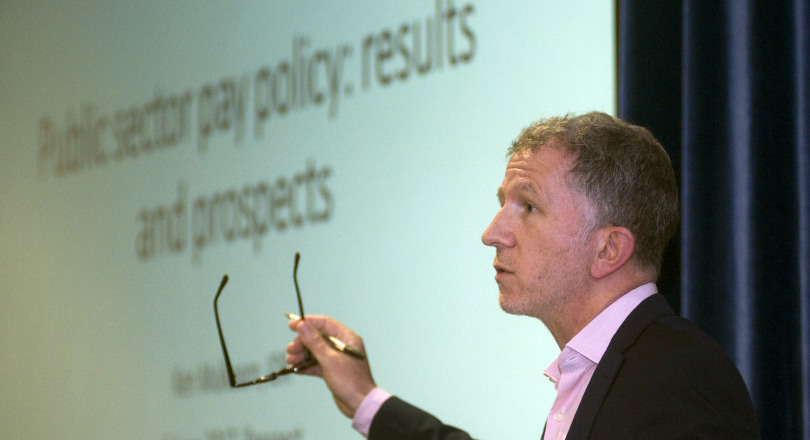Garry Graham, speaking for the executive, reminded delegates about the Makinson review, carried out in 2000. Two of its recommendations were that civil servants must have proper pay progression arrangements in place and that base pay should meet people’s living standards.
Seventeen years on, the civil service people survey found that 75% of respondents believed they would be better paid elsewhere and 40% were struggling to achieve a reasonable work-life balance.
“There is a rising recognition by commentators that this policy is unsustainable if the civil service and wider public sector is to recruit, retain and motivate the skilled professionals that it needs,” said Graham.
Caroline Coleman (Health and Safety Executive) told delegates that the union had to build support for the campaign from the ground up.
The campaign would need to highlight the problems of pay constraint in the public sector; inform public and political opinion about its unfairness and the negative effect it has on the country as a whole.
The problems resulting from low morale in the public sector, and directly related difficulties around recruitment and retention, have an impact on all UK citizens who rely upon the services provided by our members, she said.
Her branch’s motion set out a wide range of ideas on how the executive could help branches with the campaign, including:
- a briefing document for members covering the various problems with public sector pay (eg loss of progression mechanisms; losses against inflation via pay constraint; losses against private sector comparators of equivalent occupations; impact on morale and recruitment and retention etc)
- a briefing document to MPs
- an active letter-writing campaign for members (and wider families and friends)
- a petition calling for action on public sector pay (for members, their families and friends to support)
- Early Day Motions
- Parliamentary questions
- a political lobby and meeting in Westminster to present the petition, and
- any other steps they think would assist in the campaign.
Karen Chalcroft (Defence Science and Technology Laboratory) said everybody needed to take part and do something for the campaign. Her branch motion instructed the executive to start a campaign to fight the pay cap by:
- providing clear leadership from the executive and Prospect
- determining whether the membership can be bothered to fight for a fair and respectful pay rise
- joining up all public sector branches in Prospect
- starting a hearts and minds drive, to educate, agitate and organise members and help them believe that something can be done
- working with all public sector unions
- providing the confidence to not give up before we try, and
- working across Prospect to get support from other sectors in the union.
Dawn Lakin (Department for Transport) said that increases based on end of year markings were not fair or reputable. She also highlighted the detrimental effect on future pension calculations.
Her branch motion asked the executive to ensure civil servants are not used as an easy target for government savings, but receive adequate pay awards proportionate with the continued increases in the cost of living.
Phil Brown (Met Office) mentioned his branch’s pay campaign, which included a lobby of MPs. He said a national campaign could get more branches involved and help with recruiting members to the union.
Bob Akroyd (Environment, Food and Rural Affairs) pointed out that “most of us don’t get 1%”. He described the pay policy as “an insidious attack on our well-being and an immoral imposition of deteriorating standards of living”.
He cited the example of an Executive Officer whose pay scale has risen by about 1.2% or £323 over the past 10 years. Using the RPI measure of inflation, the EO’s pay would be down 33% and by 24% if using CPI.
Akroyd claimed that MPs’ salaries had risen by 18% over the same period.
Ian Hardy (Joint Forces Command) said one of the biggest problems to resolve was “member apathy”.
Actions
The instructions in the sector executive’s motion included:
- continue to highlight the growing gap in pay between the public and the private sector
- mount a petition calling for an independent review of pay in the civil service and related public sector bodies and the lifting of the 1% cap
- continue to highlight problems around recruitment, retention and morale on service delivery and an over-reliance on consultants and contractors
- provide briefings for members and branches
- gather case studies highlighting the impact on individual members
- support members who want to write to their MPs
- encourage employers to support our campaign
- support branch and central political lobbying, and
- use Prospect’s parliamentary group to highlight rising pay inequalities.
The motion also instructed the executive to support branches to:
- continue to raise equal pay challenges where appropriate, and share information on successes
- support branches where there is an appetite for industrial action and seek to coordinate such action across the sector
- learn lessons from the pay pilots in DEFRA and the Intellectual Property Office and press for further flexibilities as part of the remit process, and
- encourage employers to press for and utilise flexibilities as part of pay remit guidance.

